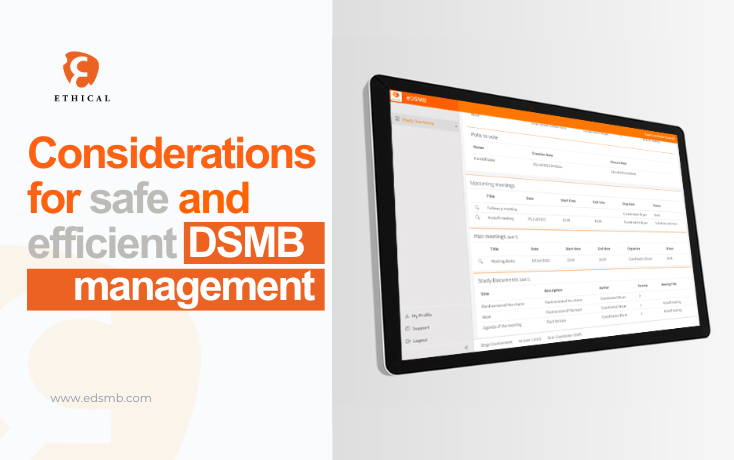Setting-up and running a DSMB is a crucial activity within a clinical study in particular because of the power the DSMB has, to decide to continue or terminate the study. Here is a quick review of the key steps and actions that will enable a study team to properly manage a DSMB and therefore ensure a smooth and safe clinical trial. It becomes apparent that a reliable and user-friendly software such as Ethical’s eDSMB® is a must-have tool for safe and efficient DSMB management.
A Data Safety Monitoring Board (DSMB) is an independent group of experts external to a study that reviews accumulating safety data and other aspects of the trial (e.g. study integrity, design aspects) to ensure that there is no unavoidable increased risk of harm for participating patients. Thus, the DSMB has the power to interrupt the study if a safety signal is detected. On the other hand, in absence of such signals, DSMB review is posed to ensure that a trial continues for an adequate period of time and is not stopped too early to answer its scientific hypothesis.
The selection and qualification of DSMB members
DSMB members must be recognized experts in the medical field of the clinical study. A recent CV must be provided and filed to attest on this. Should the study continue for a long period (several years), an update of the members CVs may be needed. The DSMB members must sign a confidentiality agreement (CDA) and cannot be taking active part in the study (e.g. investigators, Steering Committee members) and must sign a “Conflict of Interest” statement declaring that they have no financial, scientific or other interest in the company or the drug under study. Following a verification for potential debarment by Health Authorities (HA), a contract in due form must be signed between the Sponsor and each of the DSMB members respecting Fair Market Value (FMV) per local regulations. All CVs, CDAs, statements and contracts must be filed in the TMF for future inspection.
Prepare the DSMB Charter
The next key step is the preparation of the DSMB charter in collaboration with DSMB members (minimally the chairperson). Various templates exist for such documents and can be adjusted to the specific needs of the study. In particular, the nature of data to be reviewed, the party responsible for analyzing and presenting such data, the frequency of review and the possible recommendations must be clearly described. The persons involved and the communication path must be clearly described including the possible implication of third parties such as a CRO. All DSMB members must sign the Charter which is then filed in the TMF. For details on the DSMB Charter see our publication “ DSMB Handbook ”.
Planning the analysis, presentation and review of the data
A separate Statistical Analysis Plan (SAP) must be prepared, reviewed and signed for the open sessions and the closed sessions and filed in the TMF. These will be used to prepare the data for review at each of the open or closed sessions of the DSMB.
Planning the DSMB meetings
Once the DSMB Charter is signed and before the beginning of the study, a plan must be made for the upcoming meetings (scheduled and unscheduled, open and closed) including the prospected dates, the participants and the expected outcomes. Agendas and Minutes must be prepared for each session and filed in the TMF. The DSMB Coordinator is responsible, in collaboration with the DSMB Chairperson, for planning the meetings, sending invitations, recording attendance and issuing minutes. The minutes must record the discussion, questions and answers and agreed actions. They must be signed by the chairperson and filed in the TMF.
DSMB Recommendations
The DSMB recommendations (e.g. continue unchanged, plan additional review, request additional expert reviews or additional analyses, amend the protocol, proceed with pre- planned adaptations, request a meeting with the Sponsor to discuss safety and/or efficacy or stop the study) are confidential and are sent by the chairperson to the Sponsor management usually by secure email.
Audits
Any party involved in the process such as the Statistical Support Group (SSG, internal) or an Independent Statistical Analysis Center (ISAC, external) may be audited for GCP compliance and the results of the audit are communicated to the DSMB who is responsible of assuring timely resolution of any findings.
eDSMB® for smooth and safe DSMB process management
Managing a DSMB may seem like a simple process that could be handled with regular tools such as email. However, given the critical nature of the DSMB and the power that the committee has over the fate of the study it is important to control tightly all aspects of this process. DSMBs are put in place in large and usually long studies where complexity quickly builds up. In such settings, using Ethical’s eDSMB® is a good compromise allowing a tight control of the operations with minimal workload for all involved. If the platform is common to other committees’ management, the interest of using it becomes even more obvious.




